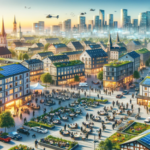In a pivotal gathering in Rio de Janeiro, foreign ministers from the G20 nations met to deliberate on escalating global tensions and explore ways to enhance the effectiveness of multilateral organizations. The meeting, held in anticipation of the annual G20 leaders’ summit hosted by Brazil, saw discussions centered around the reform of global governance, climate change mitigation, and poverty reduction as top agenda items.
Under the leadership of Brazilian President Luiz Ignacio Lula da Silva, the G20 is focusing on advocating for a restructured global governance framework. A significant part of this effort involves pushing for increased representation of developing nations within key international institutions, including the United Nations, the World Trade Organization, and multilateral banks.
Highlighting the urgency for structural reforms, Brazil’s ambassador to the G20, Mauricio Lyrio, pointed out the widespread conflicts affecting the globe, with incidents recorded in 183 locations worldwide. This backdrop sets the stage for crucial discussions among the ministers representing the world’s leading economies and developing nations.
A notable encounter at the meeting will be between US Secretary of State Antony Blinken and Russian Foreign Minister Sergei Lavrov, marking their first direct interaction since last year’s G20 foreign ministers’ meeting in New Delhi.
The G20, which accounts for approximately 85% of the world’s GDP, over 75% of global trade, and about two-thirds of the global population, plays a crucial role in shaping international economic and political policies. Brazil’s initiative to host a second G20 foreign ministers’ meeting during the UN General Assembly in New York signifies a proactive approach to fostering discussions on global governance reforms. This meeting aims to include all UN member states, emphasizing Brazil’s commitment to a more inclusive and equitable international order.
















